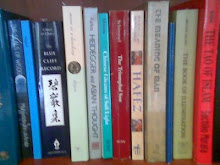
You Are The Path and Map: Mathnawi
I need a lover and a Friend
All Friendships you Transcend
And impotent I Remain
You are Noah and the Ark
You are the Light and the Dark
Behind the veil I remain
You are passion and are rage
You are the Bird and the Cage
Lost in Flight I remain
You are the wine and the Cup
You are the Ocean and the Drop
While Afloat I remain
I said, "O Spirit of the World
My desperation has taken Hold!"
"I am thy essence," without scold,
"Value me much more than Gold."
You are the bait and the Trap
You are the Path and the Map
While in Search I remain
You are poison and the Sweet
You are defeated and Defeat
Sword in hand I remain
You are the Wood and the Saw
You are cooked, and are Raw
While in a Pot I remain
You are Sunshine and the Fog
You are Water and the Jug
While Thirsty I remain
Sweet Fragrance of (my teacher) Shams is
The joy and pride of Tabriz ( whole of world indeed)
Perfume(sufi) Trader we remain
Beside attending Dailin Nur teahut
By Derek Beres - Pop - Chicago, IL, U.S.A.
Tuesday, February 27, 2007
The Sufi poet formerly known as Mawlana Jalal ad-Din Muhammad Rumi is celebrating 800 years, and the entire spectrum of Persian culture is throwing a party.
Thanks to a former University of Georgia poetry/creative writing professor with a penchant for Sufism, the name Rumi went from an esoteric otherworldly moniker to common parlance in America.
Coleman Barks began studying this small sect of Islam in 1977 and has since translated thousands of the famous poet’s works into English. And considering the man formerly known as Mawlana Jalal ad-Din Muhammad Rumi is celebrating a rather special anniversary—800 years young—the entire spectrum of Persian culture is throwing a party.
Born in what is now a region in Afghanistan and passing on in Turkey, Rumi’s name alone has become synonymous with a region often looked upon with misunderstanding and scorn. Considering that major media outlets look at this area as an addendum to and co-conspirators with a country Americans are at war with, the propagation of a poet whose entire career was about the bonding forces of humanity is a timely, and important, occurrence.
(...)
The lasting power of Rumi’s legacy has been through his words used as lyrics for qawwali and ghazal song forms. Setar player and vocalist Haale, on her two latest EP releases, Paratrooper and Morning (both self-released), works the words of Rumi and Hafiz into a panoramic blend of luscious rock, heady bass, and brilliantly produced rhythms.
She began feeding her lifelong love of Persian poetry by translating them from Farsi into English for magazines like Rattapallax, and continues to spread this song form to American ears.
“He’s been a sort of towering, mythical figure in my mind since I was a kid,” she says. “In the ‘90s I got to witness the Rumi explosion in America, when he really got into the mainstream via Coleman Barks’s translations and the Bill Moyers show. Suddenly he was everywhere.
I started translating him myself, singing his lyrics in Persian. Traditional Sufi music is a tool to put listeners and players into a trance state, to usher them into higher states of consciousness. This is a deep, powerful way to conceive of music.”
Since his remarkable life began, Rumi’s influence has spread widely. The ceremony of the Whirling Dervishes, one of the main vocations of Sufis worldwide, owes its credit to a young scribe in love with life, wine, and his teacher Shams.
Eight-hundred years later today in 2007, he continues to remind us that between perception and reality is a great distance, and if we can find it within ourselves to close that gap, an entire new world can appear.

No comments:
Post a Comment